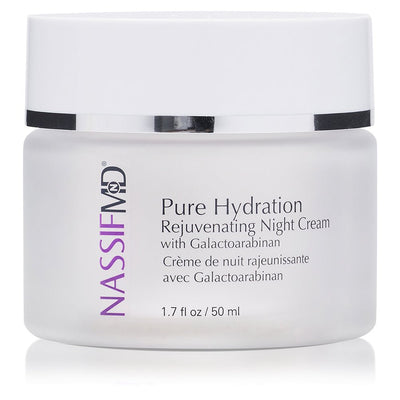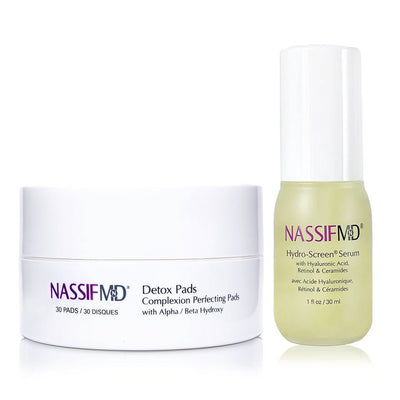Night Creams: What Ingredients Should You Look For?
Your skin heals, repairs, and rejuvenates overnight. An effective night cream aids the process, allowing you to look and feel your best. It’s truly a must-have for your nighttime skincare routine.
This article will dive into nighttime moisturizers and how to choose one with crucial active ingredients to help diminish the signs of aging, improve moisture, and support healthy skin. Keep reading to learn more about:
- What is a night cream?
- Benefits of night cream
- Day cream vs. night cream
- What ingredients to look for in a night cream
- How to choose a night cream
- Best night cream for all skin types
- How to apply night cream
Let’s go!
What is a Night Cream?
A night cream is a thick moisturizer to apply to the skin overnight. A good night cream will support the natural processes of skin protection, repair, healing, and renewal while you sleep.
Benefits of an effective night cream with ideal active ingredients include:
- Protecting the skin from free radical damage
- Promoting cellular regeneration
- Promoting collagen production
- Repairing damaged skin
- Improving skin hydration
- Reducing fine lines and wrinkles
- Reducing skin dullness
A night cream can do wonders!
Day Cream Vs. Night Cream: What’s the Difference?
During the day, your skin faces UV radiation, pollution, dirt, and other aspects of the environment. At night, while you sleep, your skin recovers from the day.
Most people will benefit from different creams during the day vs. night to support the needs of the skin.
Consistency
Night creams tend to be thicker than day creams. They lock in moisture, improve the skin barrier, and allow for better absorption of active ingredients.
On the other hand, day creams tend to be lighter and wear well under makeup.
Ingredient Profile
Because of their different roles, day and night creams tend to contain different ingredients. Night creams often focus on active ingredients to moisturize, repair, and rejuvenate skin.
SPF
Your daytime moisturizer may contain SPF to protect the skin from sun damage. You can also layer a light daytime moisturizer with an additional sunscreen product, followed by makeup. At night, you don’t need SPF.
What Ingredients to Look for in a Night Cream
Choose a night cream with antioxidants and anti-aging ingredients to aid in protecting and healing the skin. These ingredients, such as retinol, vitamin C, vitamin E, and hyaluronic acid, often have synergistic benefits when used together.
Retinol/Vitamin A
Retinol is an active form of vitamin A found in anti-wrinkle night creams and serums. As an antioxidant, vitamin A depletes with sun exposure and topical application replaces vitamin A overnight.
As a skincare ingredient, vitamin A improves the appearance of fine lines and wrinkles, hyperpigmentation (add link to hyperpigmentation article), skin roughness, and other signs of aging. It’s also critical for cell renewal and repair.
Vitamin C
Vitamin C is another antioxidant essential for skin health. Vitamin C is an antioxidant with large concentrations in the skin. It may be depleted from environmental exposures during the day and restored at night with topical use.
Vitamin C brightens the skin, promotes collagen production, and protects the skin barrier. A variety of serums and creams for day and night use contain vitamin C.
To learn more about vitamin C and retinol and why using both is a good idea, please read The Latest Skincare Ingredient Debate: Should I use Vitamin C or Retinol or Both?
Vitamin E
Vitamin E is another antioxidant that supports skin health. It offers skin protective and anti-aging benefits when used overnight in a night cream. Vitamin C and E have synergistic benefits when used together.
Hyaluronic Acid
Hyaluronic acid is an essential skincare ingredient for skin hydration and rejuvenation. It pulls water into the skin and helps it stay there for deep hydration, resulting in plump, glowing skin. Hyaluronic acid has benefits in multiple skincare product types. Use it in a hydrating serum, day and night, and then lock it in with a moisturizing cream.
To learn more about this impressive ingredient, please read What is Hyaluronic Acid, and Why is it In So Many Skincare Products.
How to Choose the Right Night Cream
Choose a night cream with several active, effective ingredients that work with your skin type. In addition, you want to avoid toxic or harmful ingredients or preservatives that haven’t been tested or approved for use in cosmetics.
NassifMDâ takes the guesswork out for you. Dr. Nassif designs all our products. He’s a facial plastic surgeon with an intimate knowledge of the skin’s structure and function and a deep understanding of science-based skincare ingredients.
Best Night Cream for All Skin Types
NassifMD® Pure Hydration Rejuvenating Night Cream is safe, effective, and incredible for all skin types. We recognize that different skin types have different needs, and Dr. Nassif designed this cream to benefit the most people possible.
The formula contains:
- Vitamin C – to fight free radicals and even skin tone
- Galactoarabinan – a polysaccharide from the larch tree to prevent water loss
- Vitamins A, C, E, and B vitamins naturally occurring in aloe
- Poria cocos extract – a mushroom extract to protect and replenish the skin
The result is a night cream that combats the signs of aging overnight. You’ll notice fewer lines and wrinkles and smooth, calm, soft, hydrated, and even skin.
Let’s look at some of the benefits for each skin type. (If you don’t know your skin type, discover it here).
Oily Skin
NassifMD® Pure Hydration Rejuvenating Night Cream is oil-free, non-greasy, and non-comedogenic (won’t clog your pores). (add link to pores article) It’s perfect for oily or acne-prone skin.
Combination Skin
Combination skin requires a gentle touch some areas produce more oil than others. For all the reasons NassifMD® Pure Hydration Rejuvenating Night Cream is excellent for oily skin, it’s also helpful for combination skin. It also doesn’t dry out the skin too much and supports dryer areas of the face.
Normal/Dry Skin
With antioxidant and innovative hydrating properties, NassifMD® Pure Hydration Rejuvenating Night Cream is an excellent choice for normal or dry skin. It’s thicker than day cream and deeply penetrates, so the active ingredients work their magic overnight.
Sensitive Skin
NassifMD® Pure Hydration Rejuvenating Night Cream is also a night cream for sensitive skin. It doesn’t contain harsh ingredients and is gentle enough for the most sensitive skin while still effective.
How to Apply Night Cream
Cleanse with NassifMD® Pure Hydration Facial Cleanser and apply NassifMD® Night Therapy Serum (or use another favorite serum), followed by any additional skincare steps. Then apply NassifMD® Pure Hydration Rejuvenating Night Cream as the last step in your nighttime skincare routine.
Rub the night cream between your fingers and smooth over your cheeks, jawline, and forehead, massaging in a circular motion. Apply to the neck in upward strokes. The cream is rich and dense but absorbs quickly and is non-greasy to leave the skin moisturized.
It can be challenging to know what to look for in a night cream, but with NassifMD® Pure Hydration Rejuvenating Night Cream, you can’t go wrong, no matter your skin type.
References
- VanBuren, C. A., & Everts, H. B. (2022). Vitamin A in Skin and Hair: An Update.Nutrients, 14(14), 2952.
- Farris P. (2022). SUPPLEMENT ARTICLE: Retinol: The Ideal Retinoid for Cosmetic Solutions.Journal of drugs in dermatology : JDD, 21(7), s4–s10.
- Pullar, J. M., Carr, A. C., & Vissers, M. C. M. (2017). The Roles of Vitamin C in Skin Health.Nutrients, 9(8), 866.
- Liu, X., Yang, G., Luo, M., Lan, Q., Shi, X., Deng, H., Wang, N., Xu, X., & Zhang, C. (2021). Serum vitamin E levels and chronic inflammatory skin diseases: A systematic review and meta-analysis.PloS one, 16(12), e0261259.
- Rattanawiwatpong, P., Wanitphakdeedecha, R., Bumrungpert, A., & Maiprasert, M. (2020). Anti-aging and brightening effects of a topical treatment containing vitamin C, vitamin E, and raspberry leaf cell culture extract: A split-face, randomized controlled trial.Journal of cosmetic dermatology, 19(3), 671–676.
- Bukhari, S. N. A., Roswandi, N. L., Waqas, M., Habib, H., Hussain, F., Khan, S., Sohail, M., Ramli, N. A., Thu, H. E., & Hussain, Z. (2018). Hyaluronic acid, a promising skin rejuvenating biomedicine: A review of recent updates and pre-clinical and clinical investigations on cosmetic and nutricosmetic effects.International journal of biological macromolecules, 120(Pt B), 1682–1695.






















